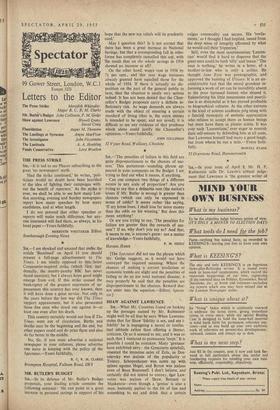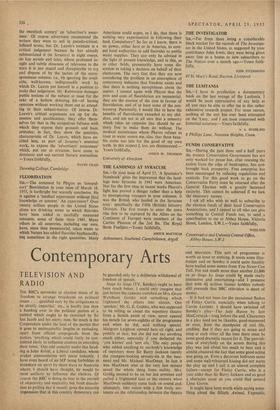Sta,—In your issue of April 8, Mr. H. F. Rubinstein
calls Dr. Leavis's critical judge- ment that Lawrence is 'the greatest writer of the twentieth century' an 'advertiser's assur- ance.' Of course advertisers recommend the writers they want to sell in pseudo-critical, inflated terms; but Dr. Leavis's estimate is a critical judgement because he has already substantiated it (in Scrutiny) in eight essays, on key novels and talcs, whose profound in- sight and subtle closeness of relevance to the texts it is just stupid and disreputable to try and dispose of by the tactics of the corre- spondence column; i.e., by ignoring the avail- able, well-known, indispensable work by which Dr. Leavis put himself in a position to make that judgement. Mr. Rubinstein damages public notions of the subject at issue for the sake of a hollow debating hit—of having opinions without working them out or attend- ing to their subject-matter. Of course Dr. Leavis's critical arguments are up for dis- cussion and qualification; they offer them- selves for that in the scrupulous fullness with which they expose their grounds and basic attitudes; in fact, they show the qualities, characteristic of Dr. Leavis, which have en- abled him, as part of Scrutiny's essential work,. to expose the 'advertisers' assurances' which, put out as criticism, have come to dominate and sap current literary journalism. —Yours faithfully,
DAVID CRAIG Downing College, Cambridge



















































 Previous page
Previous page